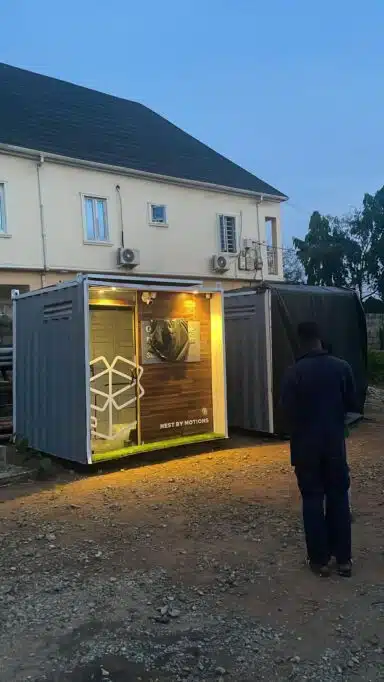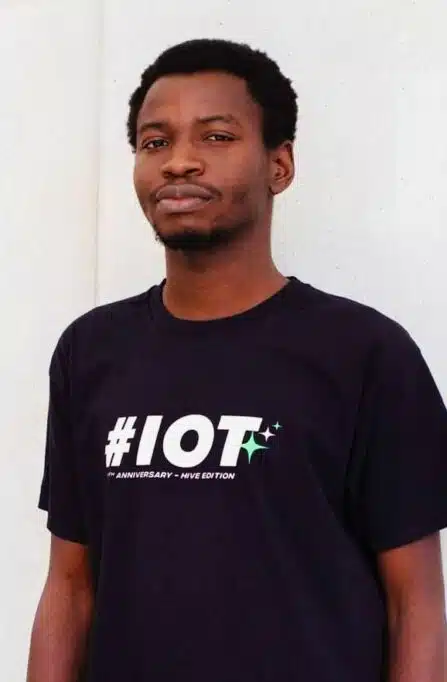Before ChatGPT or any of today’s advanced AI chatbots existed, there was Lara.ng, a chatbot created solely to help people find their way around Lagos using public transport.
After eight years of providing step-by-step navigation through Lagos’ complex and chaotic transport system, one of Lara’s creators, Samuel Odeloye, is now drawing on that experience and data to build a logistics and last-mile delivery system which, he claims, will reduce delivery costs by at least 50%.
Odeloye built Lara alongside Ladi Ojora and Nnamdi Nwanze. On a call with Techpoint Africa, he recalled how the idea first came to him. During his time in the UK, someone introduced him to a platform that provided detailed information on how to navigate the public transport system.
From knowing when to arrive at a station to where and how to get a ticket, the platform’s seamlessness left a strong impression. Lara.ng was his attempt to replicate that experience. But it was no walk in the park.
“The user experience made it look so simple, but it’s a very complex system,” Odeloye said.
Running around Lagos, mapping transit routes, and structuring data was tough work. The team also had to regularly update fares and adapt to frequent route changes.
The hard work paid off. According to Odeloye, Lara.ng had over 250,000 users just before the COVID-19 pandemic in 2020.
However, monetisation never materialised. Despite its popularity, Lara.ng never generated revenue.
“We tried different things, but the business model just didn’t stick,” he said.

Victoria Fakiya – Senior Writer
Techpoint Digest
Make your startup impossible to overlook
Discover the proven system to pitch your startup to the media, and finally get noticed.
These days, it’s difficult to get a response from Lara. Odeloye admits that the once-popular chatbot is currently undergoing upgrades.
But another reason for the silence is that Odeloye is now focused on building a new product: Motions Space—a platform that, unlike Lara, is being built from the ground up with a business model designed to stick.
From Lara to logistics

While Lara.ng never turned a profit, over the years it gathered rich, hyperlocal data on commuter behaviour, transport routes, fare estimates, and mobility patterns across Lagos.
This data is now playing a key role in shaping Motions Space—a full-stack logistics startup building smart delivery infrastructure.
The first layer of Motions Space’s solution is its logistics software platform, designed to help courier companies, delivery hubs, and small vendors manage their operations more efficiently.
Essentially, whether you manage two delivery bikes or ten thousand, Motions Space wants to help you coordinate all of them.
The software can determine which delivery riders should handle specific packages based on their current location or familiarity with the area. Tasks are automatically assigned with all necessary delivery instructions, while operators simply oversee everything from a central dashboard. The automation begins at the point of order intake and continues through to final delivery.
An Instagram vendor, for instance, could schedule deliveries with a courier service via chatbot or upload a spreadsheet with delivery details—Motions Space’s system handles the rest using AI.
“We’re solving for operational efficiency. The average logistics operator still runs their business over phone calls,” Odeloye said. “Our goal is to reduce the cost of running a logistics business by over 50%.”
He added that the platform is already delivering results, cutting delivery times by 50% and costs by 30% in early tests.
Although Motions Space’s software may seem unrelated to Lara.ng at first glance, Odeloye insists that his earlier work gathering and interpreting transport data played a crucial role.
Before building the system, they conducted two months of research, speaking to over 50 businesses. The findings revealed a widespread lack of operational efficiency, even among large companies like Konga and Jumia. According to Odeloye, these companies often require three delivery attempts before completing a single order.
The kind of operational efficiency Odeloye is aiming for would allow logistics companies to simultaneously manage 100 deliveries a day, compared to the current average of 10.
However, software alone—a web page, an API, or even an app—can’t fully solve Nigeria’s logistics challenges. And that’s exactly why there’s a hardware side to Motions Space.
The hardware side

The hardware side of Motions Space is centred on its smart lockers. While the technology itself is not entirely new—companies like SmartParcel and Fez Delivery offer similar solutions—a simple way to describe Motions Space’s competitive advantage is in two words: Tobi Oyinlola.
Oyinlola, popularly known as Tobi Internet of Things, recently gained global recognition by winning a Guinness World Record for building the world’s smallest GPS tracking device. He’s no stranger to hardware innovation.

With Oyinlola’s technical expertise and Odeloye’s logistical experience, Motions Space builds its smart lockers entirely from scratch, reducing production costs by as much as 80%. With Oyinlola’s technical leadership — called NestPods and Motions Point of Delivery (M-Pods) — are packed with features designed to make them secure, intelligent, and easy to use.
At their core is a smart locking system that uses facial recognition, OTPs, QR code scanning, and a connected access panel to ensure that only the intended recipient can retrieve a parcel. Each unit is equipped with live surveillance cameras, motion sensors, and tamper alarms to prevent vandalism and allow real-time monitoring. Every delivery is logged into the system, giving both sender and recipient full end-to-end visibility via Motions Space’s software layer.
The lockers follow a user journey that Odeloye says prioritises security. When a courier arrives, they authenticate on the locker interface, deposit the item into an available compartment, and the system immediately notifies the recipient with a code or QR link. The recipient can then collect the package at any time by verifying their identity through the app or locker screen. Motions Space has even included sensors that confirm the presence of an item, adding an extra layer of accountability.
By combining software automation with physical infrastructure, Motions Space’s lockers reduce delivery failure, improve convenience, and offer a more scalable alternative for Nigeria’s densely populated areas, where traditional door-to-door delivery is unreliable and inefficient.
Odeloye’s multilayered approach to solving logistics in Nigeria is impressive. Still, the model bears a strong resemblance to what Seun Alley, CEO of Fez Delivery, pitched at an event just a year ago. From an operations-focused software suite to smart lockers, Fez Delivery offers a near-identical stack. Yet, its lockers have not gone mainstream. The company hasn’t disclosed how many units it operates, but it’s safe to say adoption has been limited.
With a duo like Odeloye and Oyinlola at the helm, Motions Space may be the one to crack the smart locker market in a way Fez Delivery and others have yet to do.
How will it make money?
Motions Space operates on a dual business model: software-as-a-service (SaaS) and infrastructure-as-a-service (IaaS). On the software side, logistics companies, vendors, and dispatch operators pay a recurring subscription fee to use Motions Space’s logistics management platform.
This includes access to order automation tools, dispatch routing, customer tracking, and performance analytics, all managed from a single dashboard.
On the hardware side, Motions Space offers its smart lockers as infrastructure that can be leased or licensed by estates, malls, offices, and e-commerce fulfilment hubs.
Instead of selling the lockers outright, the company maintains ownership and charges usage fees, allowing it to generate ongoing revenue while keeping maintenance and upgrades under its control.
For businesses with high delivery volumes, the lockers serve as fixed delivery nodes, helping reduce delivery time and cost through pooled, drop-off logistics. It’s a model that mirrors cloud infrastructure: Motions Space owns and maintains the hardware, and clients pay for usage.
So far, the business has been bootstrapped, with some backing from silent investors, including Odeloye’s wife.
Motions Space is avoiding raising institutional funding too early, choosing instead to prove the model first.
This revenue-first approach gives them flexibility as they refine pricing, test market fit, and negotiate long-term deployment deals.
Eventually, when funding does come in, the goal will be to scale rapidly, expand the locker network, onboard more logistics players, and turn Motions Space into the invisible infrastructure powering last-mile delivery across Nigeria.
Despite its promise, the smart locker system is still an unproven concept in Nigeria. Even well-funded startups like Fez Delivery, which have raised significant capital and built solid logistics networks, have yet to crack the model fully.
The challenge isn’t just technical; it’s behavioural, infrastructural, and economic. Motions Space is betting that its full-stack approach, local engineering, and hard-earned lessons from Lara.ng will give it the edge.
But ultimately, the real test is whether the brains behind Lara.ng and a Guinness World Record-holding co-founder can succeed where venture-backed companies are still trying to figure it out.









